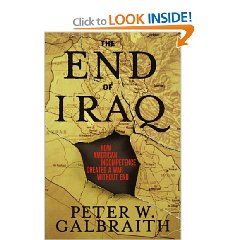Peter W. Galbraith
I recommend the other reviews, including the negative ones, for they accurately depict a lack of balance that might normally cause me to give this book one less star. However, because it has first-rate personal perspective including extraordinary travel that most US officials and journalists cannot claim, it gets the full five stars. I especially liked the “cast of characters” at the end, with names and titles and dates. A fine review.
The book can be quickly summed up by a quote from page 7: “Insurgency, civil war, Iranian strategic triumph, the breakup of Iraq, an independent Kurdistan, military quagmire.”
As the Administration continues to deny that Iraq is in a civil war, the author is compelling in citing the Iraqis themselves saying that they are–and that America lost it when it turned from liberator to occupying power. Two people come out of this book looking colossally ignorant: George Bush, who never heard of the Sunni-Shiite split before the war, and Paul “Jerry” Bremer. The author's basic proposition is that the American Republic has been undone by extraordinary arrogance, ignorance, and political cowardice.
The author is a good writer with a gift for clear phrases. He concludes that the White House and the Pentagon's politically-appointed leaders consistently “ignored inconvenient facts.” He concludes that Iraq may actually be better off in the long run, but the US is clearly not–we have gored ourselves near fatally.
I agree with the critics that suggest the author is in love with Kurdistan and overlooking some of their less rosy realities. The book is a clearly partisan document that admires the Kurds and makes the case for a free Kurdish state within Iraq (three states, one nation, not a division of Iraq as some critics loosely interpret). He is considerate of Turkish concerns and how a Kurdistan inside of Iraq but independent within Iraq, can meet their needs for a secular buffer.
There are some gems in this book that I have not found elsewhere, including a detailed accounting of the atrocities committed by Hussein against the Kurds, the Kurds rebuilding including English-speaking universities and doctors certified by the British Medical Board.
I was shocked to learn that the White House employs a CANADIAN speech-writer (who may well be one of the new Canadian clandestine case officers they are starting to field), and that this CANADIAN inserted the “axis of evil” line (which the author points out is ignorant both geographically and historically).
Overall the author could help inspire the impeachment of the Vice President. His book complements that of Ron Susskind, “The One-Percent Doctrine” and is replete with lines like “logic and facts did not stop the Bush Administration…” (page 80), “wishful thinking substituted for knowledge” (page 88, describing Undersecretary Feith), “contrary views were not just rejected, they were banned” (page 89), and “the ignorant are always surprised” (page 101).
In terms of historical documentation, the author is strongest in his detailing the incompetence of the Bush Administration in failing to plan for the war, and he lays much of the blame on Cheney for falling prey to Ahmad Chalabi's lies. The author says on page 86 that Chalabi's role cannot be overstated.
He trumps that with detail on the idiocy and arrogance of Paul “Jerry” Bremer who decided to run Iraq as his own fiefdom, and in his first two decisions, banned all Baaths from leadership positions, and dismembered the army and all security services. If there is one man to blame for all the American dead and disabled since the war “ended,” it is this well-intentioned but contextually inept person, who acted against the specific advice of the senior Army generals then serving in the field.
From an intelligence perspective, the author is credible when he points out that in the aftermath of the war and before the break-down of all order in Iraq, neither the Pentagon nor the CIA seemed to be aware of, nor interested in, the treasure trove of intelligence materials scattered in various locations throughout Iraq. This tracks with my own intimate knowledge of civilian and military intelligence, both preferring to stay in the Green Zone and not miss their evening cocktails, Robert Bauer and a few others excepted.
On page 118 the author absolutely floors me by pointing out that the Department of State spent an entire year creating a blueprint for securing the peace in Iraq, but the Department of Defense, which insisted on controlling “diplomacy” in Iraq, did not tell Bremer the detailed plan existed until a year after he arrived on the job. On page 117, the author details how the US inter-agency bureaucracy was and is out of control, with rival US factions pursuing policies that are diametrically opposed. He is particularly caustic in slamming the grotesquely incompetent manner in which the Administration threw together the nation-building team, including six young people from the Heritage Foundation who ended up running a $13 billion a year budget.
The author condems Bremer's gratuitous humiliation as having broken Iraq apart and spawned the insurgency. In the author's view, Bremer blew it in that he was a naked Emperor hiding in the Green Zone, and neither the Shiites in the south nor the Kurds in the north ever gave up their militaries or their power over their own terrain.
The book ends by stating that the US needs a strategy based on reality, not wishful thinking or ideological fantasy, and he concludes that three states comprising one nation, is the fastest way out of Iraq. I agree.
This is a solid professional account. I disagree with those critics who consider the author to be self-serving, embellishing, or otherwise deceiving the public. While he emphasizes some things more than others, and would clearly like an independent Kurdistan, on balance I consider this to one of the better first-person stories, right up there with “Squandered Victory.”









